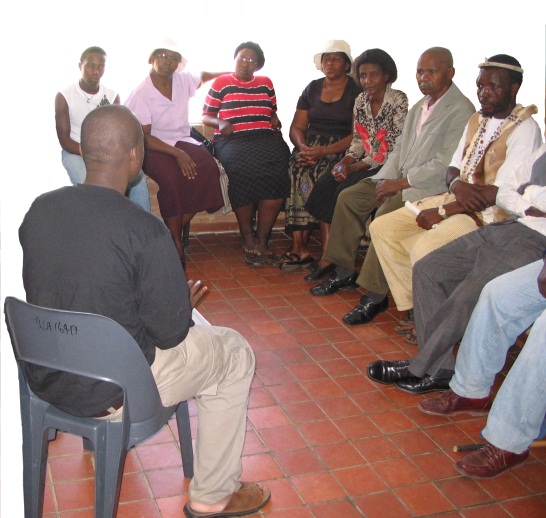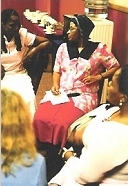
Focus groups are meetings of no more than 20 people in which coordinators and community members discuss and identify local grievances. These meetings target clients and other people who have attended CCJ’s presentations before. Through them common patterns of problems experienced by different communities are established.
Focus groups are an efficient and economical way of identifying community needs, as coordinators can then contact the relevant state service providers and ask them to address the issues raised. This approach to community issues is creating a culture of accountability by government departments to the people they are employed to serve.
In 2010 and 2011, coordinators conducted 42 groups, that were attended by 798 people.
(Left) A focus group on domestic violence
Fisani Ngcobo, Nov-Dec 2008:
“One gets so much more information from participants at focus groups. In presentations the coordinators were like priests spreading the gospel and there was less participation by the community members.” |
Zodwa Maramane, June 2008: Focus Group on Teenage Pregnancy and Domestic Violence I tried my best to meet with my clients who are my focus group. I chose those community members who do not care that much about money and those who visit my office even when they do not have a problem. We met at S’Bongile Mchunu’s house.
We discussed many issues but the greatest worry was pregnancy at schools. They wanted to know how we can deal with this problem: one of the ladies suggested that parents should speak to their pregnant daughters and advise them not to go to school in their eighth and ninth months because teachers are not nurses.

We also discussed domestic violence. They told me that there are people who are threatened with death if they report the abuse. The question was how we could help these people.
Some members were worried about the grants that are wrongly given to people who are employed and who do not qualify for grants according to the means test. They wanted to know how they can report this. So many important issues were raised and discussed and I believe that this group will work hard for their communities.
Fisani Ngcobo, Nov-Dec 2008: Focus Group on Domestic Violence

Through focus groups we try to address community problems. As a result of the focus group, we have invited representatives of government departments such as Home Affairs and Social Welfare so that community members can address their questions and complaints to these departments directly, especially about the bad treatment they receive from employees at the departments. On 27/11/08 I had my first focus group ever. The topic was domestic violence.
Issues that were discussed included that men are jealous, couples must speak to and deal with each other with respect, anger in the workplace results in domestic violence at home and negative effects on children and when there are money problems, romance goes out of the window. Also, when there is fighting there is less or no sex, sex is the pillar of each and every relationship, and upbringing results in people not wanting to share the chores.
It amazed me that one could get so much information within an hour. The participation was very good and they all spoke about their feelings and questioned why this domestic violence does not end.
Fisani Ngcobo, May 2008: Need for Birth Certificates
In this reporting period we organised a focus group meeting to establish what communities need. The most common problem in the area is the need for birth certificates for HIV and AIDS orphans. We plan to invite officials from Home Affairs and Bergville Social Welfare at management level to address the focus group.